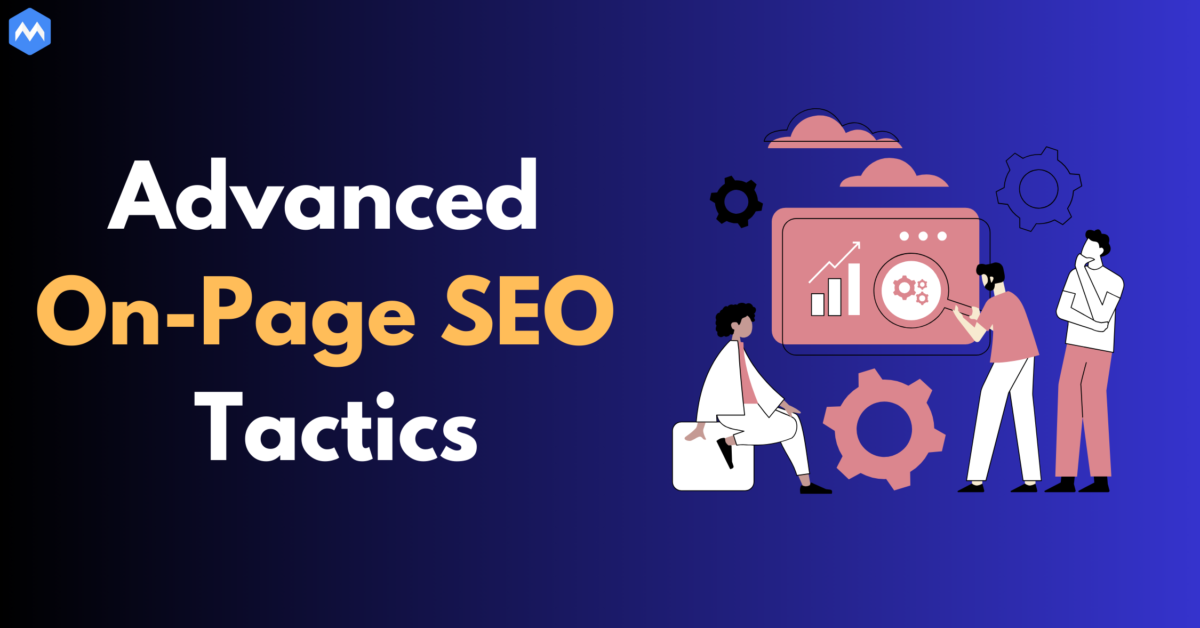The ultimate guide to advanced On-Page SEO Tactics
You can’t afford to neglect SEO if you’re a website owner. Beyond the fundamentals, you need to start using advanced on-page SEO techniques right now. Properly optimizing your website to improve your ranking in the SERPs means more site traffic, conversions, and, ultimately, higher revenue.
As of May 2022, 92.48% of all web visitors come via Google’s search engine. Although there are other SERPs, their importance pales in comparison. Whether you’re looking for sales, store visits, or leads, these SEO tricks can help you achieve your goal. Keep reading to learn more about these tried and trusted search engine optimization techniques.
It will take more advanced on-page SEO techniques if you want to up your game.
You will discover every detail there is to know about on-page SEO in this essay. We do not doubt that you want to improve your website’s traffic and search engine ranking. If you think that sounds good, continue reading.
What is On-page SEO
Every page of your website has the potential to be visited and engaged with by a person looking for information or a product or service.
It’s adjusting to the crucial on-page SEO factors mentioned above and applying specific strategies to improve each page relative to those integral elements. How those techniques work is where advanced on-page SEO comes in.
Why is On-page SEO important?
Because it informs search engines about the topic and relevancy of your website’s pages to users’ search queries, on-page SEO is essential. It takes more than just adding keywords to your content to make it valuable and meet the needs of your audience.
Optimizing your content regularly keeps your website fresh and more likely to rank well. Following these best SEO techniques for on-page SEO also improves the user experience.
This means providing straightforward navigation, fast loading times, and content that answers users’ questions. More than cramming keywords, on-page SEO involves structuring information digestibly for users and search engines.
On-page SEO can lead to higher engagement and conversion rates when done right. It’s the foundation of a strong SEO strategy, setting the stage for successful off-page SEO efforts and long-term digital success.
Advanced SEO techniques
Optimize your title tag and meta description.
An experienced SEO agency will always tell you that the title tag and meta description you use serve to support other on-page elements of your pages. Ultimately, it is up to you where to put your keywords; descriptions have the power to increase or decrease click-through rates (CTRs). Creating compelling and descriptive title tags and meta descriptions for each page. Ensure they are within recommended character limits and contain relevant keywords.
Optimize your URL
Optimizing your URLs is essential for maximum SEO. It has two parts. The first part is URL optimization, and the second is the URL structure. A permanent link (also known as a slug) is the unique URL of every page. Good URLs should not have more than 255 characters and use hyphens to ‘-‘separate the different parts.
Use hyphens to separate words, avoiding underscores or other characters. Like the page title, an SEO-friendly URL is brief, descriptive, and includes your target keyword. The URL shape must mirror the actual shape of an internet site. Add a Breadcrumb menu because it allows users to navigate your website in a structured way since they always know where they are and how far from the home page.
Look At Internal Links, Backlinks, Broken Links, and Permalinks
For a well-structured website, adding internal links is critical to helping users navigate and distribute page authority. Internal links connect different website pages, which direct users to relevant content and keep them engaged longer.
Additionally, ensuring that external links factor to legit and relevant sites can decorate credibility. Best SEO Experts should also regularly check for and fix broken links, which can detract from user experience and harm SEO efforts.
The permanent URLs of individual pages and posts should be clear and descriptive. They support a site’s overall structure and, when optimized, can improve SEO.
The possibility of having “indexed pages” by search engines is increased by using keywords and making sure every page has a distinct permalink. This makes content more easier to find and can improve a site’s visibility in search engine results.
SEO Best practices for internal linking:
- Add internal links when they are helpful for your users
- 15 internal links or less per page
- Include the links in your webpage’s main body whenever you can.
- Post links to more recent posts from older ones and vice versa.
- The most important pages of your website should have a more significant number of internal links.
- To gain insight into your internal linking structure, view the internal links report in Google Search Console.
Optimize For Page Speed
Google smiles on websites with faster page speeds. Now would be an excellent time to jump in if you’ve never checked your website’s loading speedup. To help you get started, Google offers a free PageSpeed Insights tool. After that, you can learn about fundamental web vitals and how they affect your site.
Improving your page speed will boost your SEO, so don’t neglect it. See our comprehensive guide on page speed SEO for a step-by-step tour through the process.
For Divi users, many built-in speed and performance optimization features take care of this, as well as reliable hosting providers optimized for speed.
You can even advance your optimization efforts by locating a plugin to assist with database optimization and speedup. WordPress plugins and themes , however, are limited in their ability to improve site speed. Selecting the ideal hosting company is sometimes the most straightforward approach to improving SEO and site speed.
Boost Time on Page with Animated Images
Animated images can significantly improve visitors’ time on a page, which is a factor in Google rankings. When used appropriately, these visuals capture attention and engage visitors, potentially influencing ranking factors.
However, optimizing your images for SEO is crucial. This guarantees that search engines will index them and that they load swiftly. Enhancing the originality of your content for SEO can be achieved by substituting original photographs for stock ones.
Tools like Google’s Page Speed Insights tool can help you optimize image loading times.
Conclusion
When it comes to advanced on page SEO techniques, there are multiple ways to give your website a better shot at ranking higher in the SERPs. Consider the steps which are best for you, then jump in. Keeping up with on-page SEO techniques is crucial for online visibility and success as the digital landscape evolves.
Whether enhancing user experience or leveraging schema markup, each advanced method contributes to a robust SEO framework that can significantly boost a site’s search engine rankings. Building a brand and getting a website to rank on Google involves consistent trial and error, but if you persist, you’ll be much more likely to succeed. Metaloop Marketing is the best SEO agency in Surat. Our custom SEO services have helped our clients earn more revenue for their business and helped the company grow. SEO is alive and well; to succeed, you need a fantastic and mastering SEO strategy!



Write a Comment